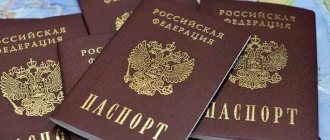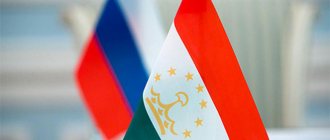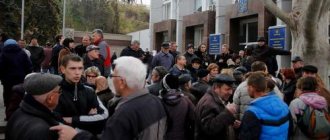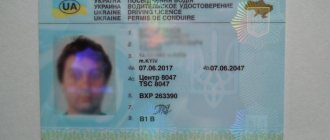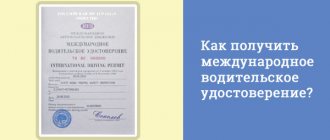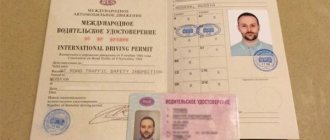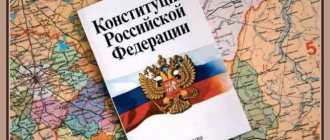Note to drivers
Many of our drivers found themselves confused after a statement from a representative of one of the traffic police MREOs of the Main Directorate of the Ministry of Internal Affairs of Russia for the Rostov Region that “citizens of the DPR, after obtaining Russian citizenship, must obtain Russian-style driver’s licenses.”
Later, Russian lawyer Yulia Gushchina gave clarifications about the driver’s license on the Pravoved website. She said that “the latest changes in the Law “On Traffic Safety” prohibit professional drivers with national licenses of other countries from working in the Russian Federation.” The lawyer added:
“To make it clearer: the answer to the question whether it is possible to work in the Russian Federation as a driver with a Ukrainian driver’s license is no. You can drive a personal car, but unfortunately you can’t work officially.”
So those who want to work as drivers in Russia must obtain not only a Russian passport, but also a Russian driver’s license, which will take a lot of time and money. To do this, you need to contact the traffic police department with an application and documents, pay fees, and pass exams. And if you have an old-style foreign driver’s license, you will even have to study at a driving school.
Donetsk resident Sergei Selivanov, citing personal experience, reported on Facebook that when crossing the border of the Russian Federation in a car with DPR license plates, the data of the republican passport must be entered into the passenger customs declaration - even if you have a Russian passport in hand. And nothing else - as long as you do not have permanent or temporary registration on the territory of the Russian Federation.
And when a mark about registration (propiska) on the territory of Russia appears in your Russian passport, you will be obliged to clear your car through customs - if it has DPR/Ukrainian license plates. Otherwise, as a citizen of the Russian Federation, you will have no legal grounds to drive a car with a license plate of the DPR or Ukraine. But if a resident of the DPR with a Russian passport does not plan to stay for permanent residence in Russia, then there is no need to register the car there.
Moscow lawyer Roman Vasiliev gives an interesting hint. Answering a question from one of the Donetsk residents regarding how to clear a car through customs, he said:
“According to the current legislation, citizens arriving (relocating) to the Russian Federation (a member state of the Customs Union) for permanent residence have the right to duty-free import of one car - provided that the import of the car into the Russian Federation from the country of previous residence is carried out no later than 18 months from the date of arrival of the specified persons for permanent residence,” the lawyer said.
Not everything is so simple with the distribution of passports in Donbass
What is expected for a very long time usually happens unexpectedly anyway. And the signing by Vladimir Putin of the Decree on determining, for humanitarian purposes, categories of persons who have the right to apply for Russian citizenship in a simplified manner, was out of the blue for many.
“We have no desire to create problems for the new Ukrainian government, but to tolerate a situation in which people living on the territory of these Donetsk and Lugansk republics are generally deprived of any civil rights - this is already crossing the line from the point of view of human rights,” - Vladimir Putin himself commented on the decision. “They cannot move normally, they cannot realize their most basic needs and exercise their basic rights. This is a purely humanitarian issue.”
According to this decree, the right to Russian passports “without delay” is given to persons permanently residing in the territories of certain regions of the Donetsk and Lugansk regions of Ukraine. A minimum list of documents required for admission to Russian citizenship is introduced, and a maximum period for consideration of applications is established - no more than three months. Moreover, citizenship will be granted immediately - directly from the day the decision on admission to citizenship is made.
Along with the application for citizenship, residents of the DPR and LPR must submit:
- an identity document with a mark of registration at the place of residence in the territory of the corresponding district of the Donetsk or Lugansk region, - documents indicating a change of surname, name and patronymic, - evidence of citizenship of a foreign state, - a certificate of marriage (divorce),
— birth certificate of the child included in the application for citizenship.
Residents of Donbass receiving passports will take an oath. The Ministry of Internal Affairs, the Ministry of Foreign Affairs, the FSB, the National Guard and the heads of the constituent entities of Russia, where the relevant bodies of the Ministry of Internal Affairs are located, are instructed to “provide conditions for the taking of the Oath of a Citizen of the Russian Federation by persons in respect of whom a decision has been made to grant citizenship.”
It would seem that everything is as simple as a rake. There is a list of documents that must be collected and submitted to the regional department(s) of the Federal Migration Service of the Russian Federation. They, in turn, check the document applicant’s reliability, give the go-ahead to receive a passport, or refuse it.
But all this is not in our situation. This was not enough for the bureaucratic class, together with their Luhansk and Donetsk colleagues, and they decided to complicate the task as much as possible.
Officials make a decision according to which documents are submitted directly at the place of residence (Lugansk-Donetsk) to local immigration services (branches). And they, in turn, carry out natural selection and transport them to the territory of the Russian Federation with their messengers. At the same time, they are introducing their own new list of documents to those mentioned in the Decree of the President of the Russian Federation and complicating this process to the point of madness.
So, it turned out that in addition to the certificate stating that you have all the certificates, you must have a LPR (DPR) passport in hand. And only this document can allow a person to become a first-class person and open the door to Russian citizenship.
Here it’s worth diverting a little from the topic and explaining in more detail the process of obtaining a LPR (DPR) passport. Before Putin’s decree, applicants for this document were several categories of persons living in the territories of the republics:
a) Persons who have reached the age of majority; b) Persons who lost their Ukrainian passport during the hostilities of 2014-2015; c) Personnel of the People's Militia (armed formations); d) Civil servants and people who live by the principle “let it happen.”
Therefore, the percentage of the population of the republics who have received DPR and LPR passports is quite small. There is evidence that 150-200 thousand people took advantage of this opportunity on the territory of the Lugansk People’s Republic, and 50 thousand more on the territory of the Donetsk People’s Republic. According to approximate information, the population of these two republics today is about 3.5 million people.
Considering these figures and the meager capacity of the passport offices of both republics, we can safely say that the opportunity to obtain Russian citizenship for the majority of the population of Donbass today and in the near future will be denied.
Now passport offices in Lugansk are experiencing a real invasion. People line up at the crack of dawn - and this is taking into account the curfew. According to the head of the LPR Pasechnik, the queue is scheduled until the end of June. There is no electronic queue in this process, only a live one, with a set of hassles and complete name checking. Anyone who went to school and knows arithmetic will understand that this process can last for decades. Although there is information that Hungarian diplomatic missions issue passports of their country to residents of Ukrainian Transcarpathia within 24 hours.
There is another side to this issue - a significant number of people who left the republics and work in Russia.
Migration officials in Russia have received permission to simplify the issuance of Russian citizenship to persons who have previously issued a temporary residence permit (temporary residence permit) and permanent residence (permanent residence). But many migrant workers have neither one nor the other.
They work in Russia, but cannot obtain Russian citizenship. Because they are unable to leave their jobs and return home for a long time to go through passport ordeals.
Even if they collect a full package of documents, they will be denied entry to the FMS departments in Russia.
All this creates a completely unfavorable picture. One gets the impression that someone has decided to once again mock the population of Donbass by sabotaging and distorting the decree of the President of the Russian Federation. Apparently, this someone decided that the suffering that people have endured over the past five years is not enough, and they need to make the task of survival more difficult.
Why do you need a passport?
Experts also advise those who have not yet turned 20 years old or from 40 to 45 years old, along with a passport of a citizen of the Russian Federation, be sure to also apply for a Russian foreign passport - even if you do not plan to travel abroad. Otherwise, you can fall into a bureaucratic trap.
If you are 20 or 45 years old, then according to Russian law you are required to change your passport within 30 days, otherwise it will become invalid and you will have to pay a fine of two to three thousand rubles. But you can start dealing with the issue of replacing your passport only the next day after you turn 20 or 45 years old. To do this, you need to go to Russia, to one of the migration departments. You will probably still be able to enter the territory of the Russian Federation with an already expired passport. But you can return back to the DPR only after you are issued a new passport as a citizen of the Russian Federation. And they will issue it and give it to you only after 30 days. That is, you will have to sit in Russia for a whole month waiting. Instead of your exchanged passport, you will be given a temporary identity card, but you cannot cross the border with it.
This problem is easily solved if you have a foreign passport - with it you can freely cross the border of the Russian Federation in one direction or the other. It is given for five years. Registration cost: 2,000 rubles for an adult and 1,000 for a child.
It is also better for your child to immediately apply for a foreign passport, because he becomes a citizen of the Russian Federation along with you. It is entered into your civil passport. But as soon as he turns 14 years old, you must take him to Russia to obtain a Russian passport. And again, you can bring a child into the territory of the Russian Federation (according to the entry in your passport and the child’s birth certificate), but you cannot take it back to the DPR. Because according to the laws of the Russian Federation, from the age of 14 he must have his own passport; he can only cross the border with it. And again, a Russian foreign passport will come to the rescue: if the child has it, then there will be no problems crossing the border.
Registration required
According to the Federal Law “On Citizenship”, the holder of a Russian passport automatically becomes a citizen of the Russian Federation and has all the rights and obligations of a citizen of the Russian Federation.
“A Russian passport allows you to obtain all the rights of a Russian citizen - the right to reside, the right to vote in elections, to work, to receive social benefits, including benefits, and the right to participate in government programs such as maternity capital. In this regard, you will need to register with all the necessary government institutions, including obtaining SNILS,” explains lawyer from Moscow Maxim Shepelev to residents of the DPR and LPR on the YouTube Internet channel.
He emphasized that the Russian passport itself without a registration mark will have the same force as with registration. This means that you will not be kicked out of the country. But for the state, the lack of registration is an offense. It is punishable by fines.
Maxim Shepelev also noted that residents of the People's Republics who have received Russian Federation passports must register (register) in Russia for official employment, treatment in medical institutions, receipt of pensions, benefits and other benefits.
“You will have to solve this issue yourself - either by registering with someone, or by buying a home and registering in it,” he says.
In turn, other Russian lawyers say that even temporary registration on the territory of the Russian Federation is enough to fully enjoy all the benefits. “Even while temporarily residing in the Russian Federation, citizens bear all responsibilities and have all rights,” Russian lawyer Pyotr Nizametdinov told a Donetsk Vecherny correspondent.
“You can have permanent registration (registration), or you can register temporarily, and at the same time obtain maternity capital, a pension, and so on. In general, you are the same citizen and bear the same responsibility as all other citizens of Russia,” Dmitry Aleksandrovich, a representative of the Moscow legal agency, explained in a telephone conversation to a Donetsk Vecherny correspondent.
FMS will exempt migrants from the LPR and DPR from a comprehensive exam
The Federal Migration Service (FMS) of Russia plans to soften the conditions of legalization for citizens of countries in which Russian has the status of the state language. According to the draft amendments to the law “On the legal status of foreign citizens in the Russian Federation,” migrants from these regions will be exempt from taking an exam on knowledge of the Russian language, history and legislation, which is necessary to obtain a work and residence permit. This norm will primarily affect citizens of the Donetsk and Lugansk People's Republics, Belarus, South Ossetia and Transnistria. The same bill introduces differentiation based on the level of knowledge of the Russian language and history for all other foreigners, depending on the purposes of their visit to Russia. Thus, there will be fewer questions for labor migrants regarding historical dates and Russian government figures.
The Federal Migration Service of Russia plans to amend the law “On the Legal Status of Foreign Citizens in the Russian Federation” in order to make life easier for some categories of migrants. The explanatory note states that the main exam for knowledge of the Russian language “creates additional administrative barriers for migrants if they apply for documents giving the right to reside in the Russian Federation.”
The law is going to be supplemented with a new clause 6.1. “The bill proposes to exempt foreign citizens who are citizens of states in which Russian is the state language from confirming proficiency in the Russian language, knowledge of the history of Russia and the fundamentals of the legislation of the Russian Federation,” the text of the draft amendments says.
Currently, the cost of a comprehensive exam in the Russian language, history and basic legislation for migrants who want to obtain a work permit in Russia is 4.9 thousand rubles. Foreigners who expect to receive a residence permit or temporary residence permit must pay 5.3 thousand rubles for the test. Not all citizens of other countries who wish to obtain a patent can afford such one-time costs.
Since March 2015, a discount on passing a comprehensive test has been introduced for citizens of the Donetsk and Lugansk republics. The Russian testing consortium, responsible for the certification system for foreigners, explained this by the serious financial difficulties experienced by visitors from the LPR and DPR. The cost of the exam for migrants from these regions who want to obtain a work permit was 2.5 thousand rubles, for those wishing to obtain a residence permit or temporary residence - 2.8 thousand rubles.
Currently, migrants who do not have a valid work permit in Russia received before January 1, 2015 take a comprehensive test on knowledge of the Russian language, Russian history and legislative framework.
As the former head of the Federal Migration Service, president of the 21st Century Migration Foundation Vyacheslav Postavnin explained to Izvestia, citizens of countries where Russian has the status of the state language may fall under the new rules.
“For example, a citizen of the LPR comes, FMS inspectors look at the Constitution of this republic, where it is written that Russian is recognized as the state language,” Postavnin explained. “And then this may become a basis for exemption from testing.
The same bill proposes to establish for all other foreigners different requirements for the minimum level of knowledge required to pass the exam, depending on the purpose of their visit.
As Angela Dolzhikova, vice-rector for work with foreign students at RUDN, told Izvestia, differentiation of tests by level of difficulty still exists, but before that it was not prescribed by law.
“The differentiation of testing of migrants is related only to the percentage of passing the exam: for those who want to obtain a patent or temporary residence permit, the minimum is 60%, for those who want to obtain a residence permit, the threshold is 75%,” says Dolzhikova. — Complicating the comprehensive exam for those foreigners who want to obtain a residence permit or temporary residence permit is absolutely logical, since they must know more about the country in which they plan to live and work for a long time.
As Dolzhikova said, new issues will not go beyond the existing program.
— For those who want to obtain a work permit, among the test questions there will be fewer questions on dates and officials. So, it will be enough for them to know the names of the president and prime minister, while for those who want to obtain a residence permit, we will ask the names of governors and local officials. Also, if knowledge of the basic provisions of the Labor Code is sufficient for labor migrants, then applicants for a residence permit must also know the Family Code.
According to the Federal Migration Service of the Russian Federation, as of May 2015, there are 2.5 million visitors from Ukraine on the territory of Russia, of which 970 thousand are citizens who arrived en masse from the territories of the southeast, and 500 thousand visitors already have permission to temporary residence and can legally work in Russia.
Let us recall that amendments to the law “On the legal status of foreign citizens in the Russian Federation” came into force at the beginning of 2015. For legal employment, obtaining a temporary residence permit or residence permit, all visitors from January 1, 2015 must pass tests in the Russian language, the basics of law and history of the Russian Federation. Those foreigners who managed to obtain a work permit before the amendments came into force can work in Russia until the end of the patent period.
Only persons with limited legal capacity and incapacity, adolescents under 18 years of age, men over 65 years of age and women over 60 years of age, as well as participants in the resettlement program for compatriots, highly qualified specialists and full-time students will be able to avoid the knowledge test.
